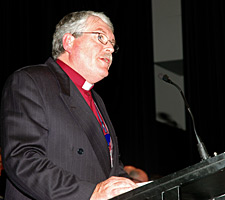 Religion of the "thoughtful, humble and limited' variety will continue to have a place in Australian politics, Bishop of South Sydney Robert Forsyth argued last night at a university debate on the church and state.
Religion of the "thoughtful, humble and limited' variety will continue to have a place in Australian politics, Bishop of South Sydney Robert Forsyth argued last night at a university debate on the church and state.
The debate, "that we should keep religion out of Australian politics', was held by the University of Sydney's Socratic Forum and sponsored by Griffith University. It was chaired by ABC radio's John Cleary.
Speaking against the question, Bishop Forsyth said he is staunchly in favour of a secular state with freedom to religious belief and freedom from it.
But he suggested that "disentangling religion' from a community’s political life is an impossible proposition.
"A large number of Australians are religious people, and will inevitably be influenced in some way by their religious beliefs. It is far better to deal with that openly," he said.
It is incredibly difficult, Bishop Forsyth argued, to come to a "clear, untroubled, objective, common, non-religious consensus' in the political sphere.
"It is simply arbitrary to exclude religious perspectives which may be helpful, or even true in the ongoing political debate," he said.
He also suggested that complaints about the intrusion of religion into politics are often simply a mask for expressing disagreement over policy.
"The criticism only seems to be about so-called right-wing issues, like RU486 or gay marriage," he said.
"Is anybody really going to depreciate the contribution of a Dr Martin Luther King or a Desmond Tutu?"
NSW Democrats leader opposes Bishop's view
Speaking in favour of the question was leader of the NSW Democrats, Dr Arthur Chesterfield-Evans, who told Sydneyanglicans.net that religion is "distorting government priorities'.
He said there is a lack of accountability from religious organisations that receive government funding, particularly in health and education.
"Education needs to be secular education," he said.
"It should be about reading, writing and arithmetic" if you're going to teach about Jesus dying on a cross, that's fine, just don't expect subsidies for it: that's religious education."
Dr Chesterfield-Evans said he does not want to censor the opinions of Christians but called rather for a "level-playing field', and a limitation of that the "disproportionate' influence on policy currently enjoyed by religious groups.
Other commentators at the debate included Associate Professor Suzanne Rutland, Chair of the Department of Hebrew, Biblical & Jewish Studies, University of Sydney, Jamila Hussain from the Faculty of Law, University of Technology Sydney and Dr Stephen Mutch, Honorary Associate in the Department of Politics and International Relations at Macquarie University.
The Australian Democrats recently attempted to gauge the views of the Australian public on church/state issues with an online survey.
It proved controversial, partly due to the claims of bias of some of the questions from Christian groups. It sparked a grassroots email campaign encouraging Christians to make their voice heard.
The Democrats announced that the party would not release the results from the 40,000 respondents because they ‘understand it was widely promoted in ways likely to have skewed the results’.
Story by Andrew Robinson



















